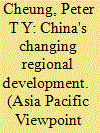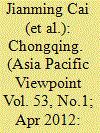|
|
|
Sort Order |
|
|
|
Items / Page
|
|
|
|
|
|
|
| Srl | Item |
| 1 |
ID:
111878


|
|
|
|
|
| Publication |
2012.
|
| Summary/Abstract |
The path towards a closer integration in Advanced Producer Services (APS) industries between Hong Kong and Shenzhen has been difficult despite favorable locational factors. Based on the authors' long-term and extensive working experience in the APS sectors in the Pearl River Delta, combined with in-depth interviews with senior officers of companies who are APS providers in Hong Kong in 2009, this paper will examine the factors, both tangible and intangible as in institutional and non-institutional, regulatory and non-regulatory, as well as legal, governmental, social and cultural, which affect and resist APS integration between Hong Kong and Shenzhen. The findings suggest that the integration of APS between Hong Kong and Shenzhen has been greatly impeded by unfavourable institutional factors that have overwhelmed locational advantages. There are substantial inhibitions against free competition in the China marketplace including non-regulatory and intangible inhibitions, embodied by local protectionism, heavy reliance on guanxi, rampant insider games and nepotism, excessive bureaucracy, an inadequate legal system, pervasive rent seeking and so forth that block integration between the two cities. The paper will also examine the Qianhai Free Trade Service Zone, the ambitious initiative made by the Shenzhen government to promote APS cooperation between the two areas.
|
|
|
|
|
|
|
|
|
|
|
|
|
|
|
|
| 2 |
ID:
111877


|
|
|
|
|
| Publication |
2012.
|
| Summary/Abstract |
With the rise of cities as geographical units, intercity cooperation has been increasing worldwide. Benefits of regional city-to-city (C2C) cooperation can be seen in the political added value and added value of urban competitiveness. This paper focuses on the Jiangyin-Jingjiang Industrial Park in the Yangtze River Delta region as a case study to explore these benefits in regional C2C cooperation in China's local context. It is found that political added value is more effective and efficient in accelerating strategy formulation and partner selection within regional C2C cooperation. The added value of urban competitiveness is more crucial in regional C2C partnership maintenance serving as an internal driving force for sustainable C2C cooperation. In addition, intervention from the provincial government tends to consolidate the impact of urban competitiveness in regional C2C cooperation. The empirical study also sheds light on the dynamics of China's economic decentralisation, political centralisation and the market logic interwoven with state authority.
|
|
|
|
|
|
|
|
|
|
|
|
|
|
|
|
| 3 |
ID:
111873


|
|
|
| 4 |
ID:
111876


|
|
|
|
|
| Publication |
2012.
|
| Summary/Abstract |
The spectacular growth of Chinese cities since the 1980s is often theorised as reflecting the advantages of latecomer development (ALD). ALD has been more effective in cosmopolitan, globally accessible coastal cities than outer cities. As leading cities, like Shanghai, close the development gap, the potential for 'easy' ALD growth falls off rapidly. Because institution building is more difficult than firm-based growth, ALD strategies may generate rapid short-term economic growth but not sustainable development. Accordingly, Chongqing municipality, with a population of 33 million, in West China, is pursuing a beyond latecomer advantage model. This is characterised by: (i) reducing poverty and rural-urban disparity through accelerated urbanisation, rural-urban integration and emphasising human resource development; (ii) upgrading the value added of Chongqing's economy through targeting of FDI and incentives to local start-ups; (iii) endogenous development, reducing risks from external shocks; (iv) Hukou reform; (v) establishing a land use conversion certificate market to rationalise land use; (vi) emphasis on morality to address crime/corruption; (vii) recognition of the importance of amenity in attracting investment and talent; and (viii) establishing a longer developmental time perspective. This paper explores this Chongqing model in detail.
|
|
|
|
|
|
|
|
|
|
|
|
|
|
|
|
| 5 |
ID:
111879


|
|
|
|
|
| Publication |
2012.
|
| Summary/Abstract |
For a long time, China has been focusing primarily on pursuing economic growth, with less concern about social and environmental development issues. This may make China's development unsustainable. In contrast to its current economic-oriented approach predominated by economic growth, this research note presents a newly proposed approach of 'major function-oriented zone' (MFOZ) that is designed by our research team and is largely accepted by the central government and incorporated into its 12th Five-Year Plan. This approach tries to rationalise China's regional development and insists that each region should have its unique functions to perform, determined by its own characteristics, conditions and requirements. With this approach, the central government is able to monitor and coordinate regional and local developments, and hence the 'Planning of MFOZ' is seen by the central government as a tool to steer spatial arrangements for the country's long-turn sustainable development.
|
|
|
|
|
|
|
|
|
|
|
|
|
|
|
|
| 6 |
ID:
111880


|
|
|
|
|
| Publication |
2012.
|
| Summary/Abstract |
Although known as 'the factory of the world', the labour intensive industry in the Pearl River Delta (PRD) region has lost its edge. The region is rapidly transforming itself, and the integration of the region is part of this process. Through a review of the integration progress of the city-region of the PRD, this research note compares two attempts in regional integration made by Guangdong's provincial government, the 'Modernization Plan for the PRD Economic Zone' in the 1990s and the 'Outline of the Plan for the Reform and Development of the PRD' in 2008. It shows that, in terms of the scope and extent of regional integration, the second attempt, with the important endorsement of central government, has proposed more comprehensive measures for implementation, and these measures seem to be speeding up the integration process in the PRD.
|
|
|
|
|
|
|
|
|
|
|
|
|
|
|
|
| 7 |
ID:
111875


|
|
|
|
|
| Publication |
2012.
|
| Summary/Abstract |
This paper examines the interactions between subnational governments in influencing the Chinese national state in economic and spatial planning by focusing on two cases in south China, namely the pursuit of a new reform and development plan by Guangdong province in 2008 and Hong Kong's effort to position itself in China's 12th Five-Year Plan (FYP). The intergovernmental dynamics inside the Greater Pearl River Delta (PRD) can be interpreted as the policy advocacy and coordination of entrepreneurial local states in a fragmented, authoritarian polity. Guangdong province actively pursued central approval of the PRD's regional plan because central support is critical not only for approving specific projects but also for steering its development direction and providing a policy tool to impose coordination plans in order to achieve better regional coordination and resource allocation inside the Delta. The province has skilfully leveraged on Hong Kong to get central approval and delegation of power over pilot measures regarding Guangdong-Hong Kong economic cooperation. Similarly, the Hong Kong Special Administrative Region government's efforts to secure a privileged position for Hong Kong in the 12th FYP can be considered as a competitive positioning strategy in view of growing competition within the PRD and from other regions.
|
|
|
|
|
|
|
|
|
|
|
|
|
|
|
|
| 8 |
ID:
111874


|
|
|
|
|
| Publication |
2012.
|
| Summary/Abstract |
Neoliberalism has become dominant in both thought and practice throughout much of the world since the early 1970s. In China, neoliberal ideas are growing fast, even as it festers and stagnates in capitalist economies. To capture this process, many scholars have extensively studied market politics in China, demonstrating how state functions are rearticulated downwards and outwards to allow local discretion and market formation. The result is a burly wave of urban entrepreneurialism, which becomes a key municipal strategy to enhance place-specific, socio-economic assets. However, such arguments neglect a counter-trend in which the state has deterritorialised and recentralised some key functions. This paper draws on two cases in urban land administration and state planning regulation to argue that state functions are being reassembled as a new post-crisis political instrument to reassert the functional importance of top-down regulatory control. Economic decentralization is now counterbalanced by the rise of state strategies to control the articulation of scales through which a more centrally consolidated power can be achieved. Rather than viewing markets as taking over the state and local territorial discretion overshadowing hierarchical administration, the paper emphasises the important role of state and top-down regulation in the current post-crisis context under transition.
|
|
|
|
|
|
|
|
|
|
|
|
|
|
|
|
|
|
|
|
|